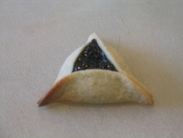Purim Ditty Welcome to Purim, holiest day of the year. Sanctity and profanity merge in A time so lost beyond the horizon We lose the Name. Haman and Mordechai now are drinking buddies, Old pals who trade stories. Meaning fades and concepts melt-- They were only windows, after all, That peer into immeasurable truth. There are no boundaries here. After a few, the two stumble home, Their heads spinning, adlayada. They fumble keys, feed the cat, And wake sober on Pesach, Each in the other one's bed. Welcome to Purim, holy of holies, Fulfillment of the solemn cycle. Miracle and revelation, Sorrow and celebration, Find strange completion In this day of days. All others we toss away to say We finally have remembered to forget. |
|
The Torah says, "You shall place inside the breastplate of judgment the Urim and Tumim and they shall be over Aaron’s heart whenever he comes before Adonai. Thus, Aaron shall carry the judgment of the Israelites over his heart before Adonai always" (Exodus 28:30).
A passage in the book of Samuel shows the Urim and Tumim in action. When King Saul believed that a member of the Israelite army had committed a sin that removed God's favor, he used the Tumim to discover who was at fault. The text says that Saul separated himself and his son Jonathan from the troops and used the Tumim to determine whether the fault was with Jonathan or the rest of the army. The Tumim showed that it was Jonathan who had sinned. He then confessed his actions (I Samuel 14:41). The idea of using special objects as oracles to divine secret knowledge existed in many cultures of the ancient world. Think of the Urim and Tumim as a special pair of dice that a king or high priest could throw to determine a propitious date for attacking an enemy or discovering a source of divine disfavor. The Urim and Tumim were instruments of selection that helped their user discover meaning and sense in a world of seeming chaos and uncertainty. In that respect, the Urim and Tumim are rather like the Torah itself. They were a guide to finding a right path in a world that seems to be all wilderness. The lovely irony is that, during the very time of year when we read about the Urim and Tumim in the Torah, their exact counterpart appears in an upcoming holiday. Purim, of course, is the holiday named for pur, the selection tool used by the evil Haman to discover the date for the destruction of the Jews. The book of Esther tells how, "In the first month, the month of Nisan, in the twelfth year of King Achashveirosh, pur (which means 'the lot') was cast before Haman concerning every day and every month, until it fell on the twelfth month, the month of Adar" (Esther 3:7). In the Purim story, Haman's use of the pur is a kind of inside joke. Haman is depicted as an evil and superstitious man who denies God. He believes in a universe without rules that is governed only by strength and power, not by ethics or righteous divinity. His reliance on the pur is a statement about his allegiance to a random universe. The joke is that, when Haman casts the pur, the date revealed—seemingly by chance—is nearly the last possible day on the calendar. Nisan is the first month of the year; Adar is the last. Poor Haman cast his dice on New Years Day to find out when he would realize his dream. The dice landed on the equivalent of December 15th. Haman would have to wait eleven and a half months—plenty of time for his intended victims to discover his plan and prepare their defense. The book of Esther, famously, is the only book of the Hebrew Bible that does not contain the name of God. Yet, God's presence is felt everywhere in it. God appears as the unnamed source of strange coincidences that show a higher power at work against the forces that worship only human might. The relationship between the Urim and Tumim, on one side, and the pur, on the other, is paradoxical. Both appear to be instruments of random selection, but their meaning is opposite. Haman selected his date with a pur because he believed in chaos. A random selection device, according to this view, would reflect the nature of a random universe. The high priests and kings of Israel, on the other hand, used the Urim and Tumim because they believed in an underlying order hidden beneath the seeming disorder of reality. This device that freely chooses among options, to them, would have been like a compass that points to the true north of God's will, revealing the hidden pulse of God's magnetic field of meaning. What do you believe? Do you, at a fundamental level, believe that there are reasons and purposes within the universe that usually are hidden beyond the reach of our senses? Or, do you believe that your presence in the world is just the product of a long series of meaningless coincidences? Either position can be defended, yet it is difficult to see how both can be true. Shall you choose one or leave it to chance? Other Posts on This Topic: Tetzaveh: Keeping the Fire Burning Ekev: Deuteronomy vs. Job Imagine There's No Haman
Imagine there's no Haman It's easy if you try No efforts to destroy us No need to wonder why Imagine all the people Living for God’s way! Imagine there's no hatred It isn't hard to do No one to bow down to And no rulers too Imagine all the people Living life in peace You may say that I'm a dreamer But I'm not the only one I hope someday you'll join us Purim joy for everyone! Imagine no humiliation I wonder if you will No need for greed or hunger All can eat their fill Imagine all the people Noshing hamantaschen! You may say that I'm a dreamer But I'm not the only one I hope someday you'll join us Purim joy for everyone! If there is one Jewish holiday that screams out "joy," it has to be Purim. Yet, I'm sure that there are things we can do to make Purim an even better expression of joyous Judaism.
Instead of going through another year of the same old youth group carnival, the same old spiel of Broadway retreads, and the same old dry Megillah reading, we can learn from each other to create a Purim of real, heartfelt joy. Come on, people, I want to hear your best ideas! My friend, Rabbi Riqi Kosovske of Congregation Beit Ahavah in Northampton, Massachusetts, has a couple of ideas that I really love. Her congregation is currently planning its third annual "Queen Esther's Drag Ball," a Purim night event for adults held at a local dance club. The following day they will have their fourth annual "Megillah Reading and Purim Justice Fair." Rabbi Riqi says she got the idea of a "justice fair" from IKAR, the joyful and innovative congregation in Los Angeles. She explains that, in her congregation's Purim fair, there are no junky plastic prizes. For an entry fee of two to five dollars (discounts for those in costume), participants play games to win "Mitzvah Money." The Mitzvah Money is awarded freely at the booths where participants play different kinds of games. After playing, participants take their winnings to the "Justice Table" where they can divide it any way they wish by placing it into six large tzedakah boxes. Each box has the name of a social justice organization and a poster that explains what the organization does. At the end of the evening, members of the youth group count the Mitzvah Money in each box to determine the percentage that each organization will receive of the money raised at the event. I love this idea because it gets right to the heart of what I mean when I say that we need innovative ideas to make Judaism more joyful. It promotes broad community participation in an activity that is fun, memorable and makes people feel good about being Jewish. Most importantly, it gives meaning to the holiday and reinforces the mitzvah of Matanot LaEvyonim—making gifts to the needy on Purim. What are your best ideas for making Purim even more joyful? Please respond with your comments so that your ideas can be planted like seeds in Jewish communities everywhere to create a more joyful and meaningful Judaism. |
WelcomeThis blog is about living a joyful Jewish life and bringing joy to synagogues and the Jewish community. Join the conversation by commenting on posts and sharing your experiences. For more on the topic, read the First Post.
Recent PostsPurim & COVID-19
The Honor of Heaven Chasing Our Own Tails Drilling Under Your Seat Change the World Self-Righteousness Where We Came From What We Must Believe Is Passover 7 or 8 Days?Origin Story Va'eira: Leadership Jeff's Favorites• First Post
• Searching for How the Bible Defines Marriage • The Difference between God and Religion • In the Beginning of What? • Rape, Abortion and Judaism • Ten Thoughts about Being a Rabbi • Temple Dues and Don'ts • A Pesach Lesson from Yoga • The Purpose of the Torah Torah PortionsGenesis
Bereshit Noach Lech Lecha Vayera Chayei Sarah Toledot Vayetze Vayishlach Vayeshev Miketz Vayigash Vayechi Exodus Shemot Va'eira Bo Beshalach Yitro Mishpatim Terumah Tetzaveh Ki Tisa Vayakhel Pekudei Leviticus Vayikra Tzav Shemini Tazria Metzora Acharei Mot Kedoshim Emor Behar Bechukotai Numbers Bamidbar Naso Beha'alotecha Shelach Korach Chukat Balak Pinchas Matot Masei Deuteronomy Devarim Va'etchanan Ekev Re'eh Shoftim Ki Tetze Ki Tavo Nitzavim Vayelech Ha'azinu Vezot Haberachah Holidays Shabbat Rosh Chodesh Pesach/Passover Omer Period Yom HaShoah Yom HaZikaron Yom Ha'atzma'ut Pesach Sheini Lag B'Omer Yom Yerushalayim Shavuot Fast of Tammuz Tisha B'Av Tu B'Av Rosh Hashanah Days of Awe Yom Kippur Sukkot Hoshanah Rabbah Shmini Atzeret/ Simchat Torah Chanukah Tu BiShvat Adar (Joy Increases!) Purim Archives
October 2023
Loading
|



 RSS Feed
RSS Feed
